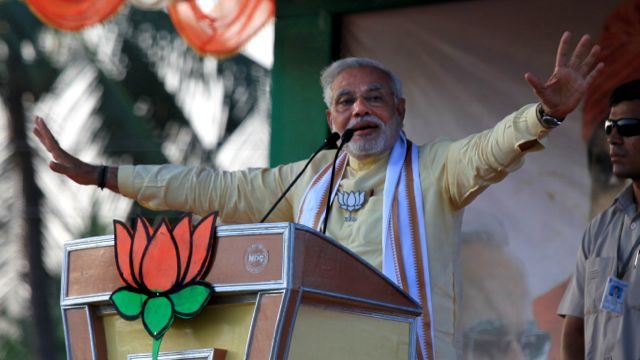SUMMARY
This is AI generated summarization, which may have errors. For context, always refer to the full article.

NEW DELHI, India – The rise of Indian prime minister-elect Narendra Modi is a rags-to-riches success story set to lead to a change in style in New Delhi power circles, long dominated by an English-speaking elite.
The victory for Modi’s right-wing Bharatiya Janata Party (BJP) was described as a “democratic asteroid” by one commentator and the manner of his leadership could prove alien to foreign allies.
The results on May 16 confirmed the storming of New Delhi by a provincial politician with no prior role in national politics, a man who once swept floors and who has long scorned the country’s first family, the Nehru-Gandhi dynasty.
Unlike many former prime ministers, he has no foreign education, having left school at 17 and gained his degrees through distance learning.
He is far more comfortable speaking Hindi or his native Gujarati than English, while his foreign travels have taken him more frequently to east Asia than the West, which boycotted him over religious riots in 2002.
“Modi is a Gujarat-born Indian, who is not too comfortable with Western mode of living nor is he Western in his mannerism,” said Rudrangshu Mukherjee, an Indian historian.
“And he is not ashamed of it,” Mukherjee added ahead of Modi’s swearing into office on Monday.
He is also devoutly and openly religious, having spent his adult life in organizations committed to defending the Hindu character of India, home to sizeable minorities including 150 million Muslims.
In his experiences, politics and religiosity, he stands in stark contrast to India’s most famous statesman of the last century, first prime minister Jawaharlal Nehru.
Almost exactly 50 years since his death on May 27 1964, Modi will be sworn in as prime minister, the first to have been born after Nehru’s famous independence night speech when he said the country faced a “tryst with destiny”.
Breaking with the past
Nehru, a socialist and staunch secularist, has towered over India since the partitioning of the subcontinent in 1947 and his daughter Indira Gandhi and grandson Rajiv Gandhi went on to become prime ministers.
Great-grandson Rahul ran the Congress party’s disastrous campaign against Modi that saw the party slump to its worst ever result with just 44 seats in the 543-member parliament.
Nehru’s party has run India for all but 13 years since independence and the BJP is the first party other than Congress to win a majority in parliament.
Rasheed Kidwai, a political commentator and journalist who has written a book on the dynasty, said Modi was very different to the last BJP prime minister, Atal Bihari Vajpayee.
“Vajpayee was a BJP prime minister, but his thinking was very Nehruvian,” explained Kidwai, referring to his ability to keep the right-wing Hindu hardliners away from his politics.
“Modi’s ideology is anti-Nehruvian,” he said.
Nehru once told an American diplomat that he was the “last Englishman to rule in India” while The Guardian newspaper said last week in an editorial that Modi’s victory represented the day “when Britain finally left India”.
Speaking before the election results were declared, Modi told the Indian news weekly Open that he would break the “cabal” in Delhi which had “vested interest in the status quo”.
He still leads an austere lifestyle, with little contact with his family. His elderly mother took public transport to the polling station on voting day instead of one of his official vehicles.
“There are no hangers-on or durbaris (courtiers),” Modi told the news weekly, making a veiled reference to the political culture around the Congress party and the Gandhi leadership.
In another interview, he told the Indian daily The Times of India that he considered himself an “outsider not only to Delhi politics but to politics per se.”
Modi, who built a reputation as an efficient administrator during his 13 years running Gujarat, is set to introduce some corporate-style methods to the prime minister’s office.
Last week, he ordered bureaucrats from top ministries for succinct, power point briefings within 24-hours of him taking office, breaking away from the tradition of working from cumbersome paper files.
People chosen by Modi to run his government are likely to be from smaller towns with Indian education, and more likely to speak Hindi than English, Kidwai said.
“The Oxbridge (Oxford and Cambridge) educated hierarchy will be reduced,” he added. – Rappler.com
Add a comment
How does this make you feel?
There are no comments yet. Add your comment to start the conversation.